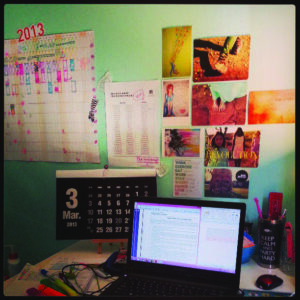Editor’s Note: This was first published in The Conqueror Magazine, and then in the LOVE issue of One Voice Magazine in 2013. Although the pandemic is shifting the way we do education, there are still good, practical tips and advice you can glean from this survival guide. Enjoy maximizing your studies!
TO STUDENTS EVERYWHERE
This booklet, based on information provided by The College Board, is all about making the most
of your time at school.
Once you know your class schedule and how much time you’ll need for studying, one of your biggest challenges will be learning to get organized. Master that, and you’ll study more efficiently, learn more productively; and have more time for fun.
Read on, and find out how to manage and organize:
Study Space
Working Files
Study Time
Note Taking
Memory Improvement
Concentration
Test Performance
And More!
HOW TO GET ORGANIZED FOR STUDYING
Study Space

Your first priority is to create a space where you can concentrate. You will need:
– a quiet place with a minimum of visual distractions.
– a comfortable place with good lighting;
– a work surface large enough for your books, papers, and files.
– a basic supply of filing aids, like file folders, and Index cards in various colors (for coding), as well as a place to keep them.
Working Files
At the beginning of each semester or quarter, it’s a good idea to start a file folder for each course and each activity. These folders – or Working Files – will become a handy place to keep the papers and materials you’ll need to refer to when you’re studying, writing a report, or planning your after-school schedule.
HOW TO MANAGE YOUR TIME
Make a Calendar
Start by making a “to do” list, for example:
– due date for history term paper
– study schedule for math
– audition for drama group
– conference with teacher/ guidance counselor
– tennis lesson
– part-time job
-dental appointment
– TV special you don’t want to miss
Your list should include date, time, place, and people. You might even want to transfer this list to a calendar for easy reference. Make it a part of your Working Files, and keep it at your desk, bookshelf, bedside table, bulletin board, or wherever it’s convenient. AND be sure to check it EVERY DAY.
Whether yours is a daily, weekly, or monthly list, don’t toss it away when the time period is over. It’s a valuable record to refer to when you’re planning next semester’s or next quarter’s activities.
Be sure to put study time high on your priority list when you setup your calendar. Make a realistic estimate of how many hours you’ll need each day; block out study times in manageable segments; and then treat them like the important appointments they are.
Pace Your Study Time

At this point, you probably have a very good sense of your personal rhythm—what part of the day you work most effectively, and when your energy is low. Try to schedule study times when your ability to concentrate is at its peak. If your class schedule is too heavy to make that possible, at least try to save easy, routine assignments for your low-energy periods.
Taking Reading Notes
Note-taking is a part of learning. It helps fix the information in your mind as you organize and outline on paper the material you want to remember from your reading. Here are some basic tips:
– Zero in on the key facts, and record them `concisely, in your own words, in a notebook or on
index cards.
– Keep your notes as brief as you can. There’s no point in producing a handwritten duplicate of the textbook.
– Keep notes for each course separate in your Working Files, so you can find the ones you need
quickly at exam time.
HOW TO IMPROVE YOUR MEMORY
The key here is repetition.
Memory experts recommend using as many of your senses as possible when you’re learning information through repetition. Some suggest, for example, that you read aloud rather than silently when you are trying to memorize something. You hear the words as you see them, and one sense reinforces the other.
If you want to memorize certain facts, read over your notes on those facts several times. Then put your notebook aside and write the facts on a separate piece of paper or on index cards (remember flash cards?). It helps to use different colors for different subjects. Compare your results with the original notes to find out how much you remembered, as well as what you have to spend more time on.
HOW TO TAKE CLASS NOTES
Another essential skill for learning is the ability to take clear, well-organized class notes. The points covered in class are, for the most part, those the professor considers most significant. Often, they serve as a summary outline of the course material. By listening carefully and jotting down key names, dates, and events, you’re giving yourself a triple advantage.
The opportunity to:
– reinforce information as you write it and see it in front of you.
– review information later, at your convenience.
– improve your chances for test success.
It’s a good idea to review your class notes each day, rather than waiting until just before a test to go over three or four weeks of notes. If you reread notes the same day you take them, it will help you to:
– reinforce the information you have collected in class that day.
– eliminate the pressure of having to absorb massive amounts of information in a single study session.
– identify areas you haven’t understood—a good source of potential questions for the next class.
HOW TO IMPROVE CLASSROOM CONCENTRATION
Paying attention in class will help you raise your grades. It will also save you study time, so you can
spend more time pursuing outside interests.
One of the biggest stumbling blocks to concentration is anxiety over lack of preparation for class. If you do the required work as assigned, studying and reviewing your notes regularly, you’ll be able to concentrate fully on the material covered in class on any day.
The best way to maintain concentration is to be an active learner. Don’t just listen. Take notes and ask questions. Speak up and ask for clarification if you need it. Jot down comments and questions to yourself if the lecture prompts some train of thought you want to pursue independently—but do it quickly, so you can stay focused on the discussion.
Remember, a part of your grade for each course is a subjective evaluation by your teacher. An active
student has the advantage.
HOW TO LEARN FROM PAST PERFORMANCE
Virtually, students study for tests. Smart students also study from tests. When you get a test paper back,
don’t just look at the grade and file it away. Go over every question. Reviewing those you answered correctly will reinforce your knowledge. Analyzing the questions you missed will give you a checklist of what you need to spend more time studying on. Finding out the answers to questions will make studying for final exams easier.
It may not be easy, but try to think of tests in a positive way. After all, they show what you know and have accomplished. They can also tell you what you haven’t mastered yet and where you should spend more time. Use them as tools to work with and learn from, and keep them in your Working Files for future reference.
TAKE ADVANTAGE OF THE LIBRARY
The library is a terrific resource. Using the various media available in your school or public libraries can
help you write an essay, give an oral report, do a science project, master math, or learn a foreign language. Remember, the library is a source of all sorts of useful information. Use it to your advantage.
HOW TO GET A HEAD START ON THE FUTURE

Organization is one skill that will always come in handy.
Your student years are a time to learn, expand, and refine the knowledge you’ll rely on as an adult. They
are also a time to develop practical skills and responsible attitudes. Getting organized will help you get
more from your school years and make you more successful on the job–and at life in general–in the future.
*Initially published online on July 14, 2020.





